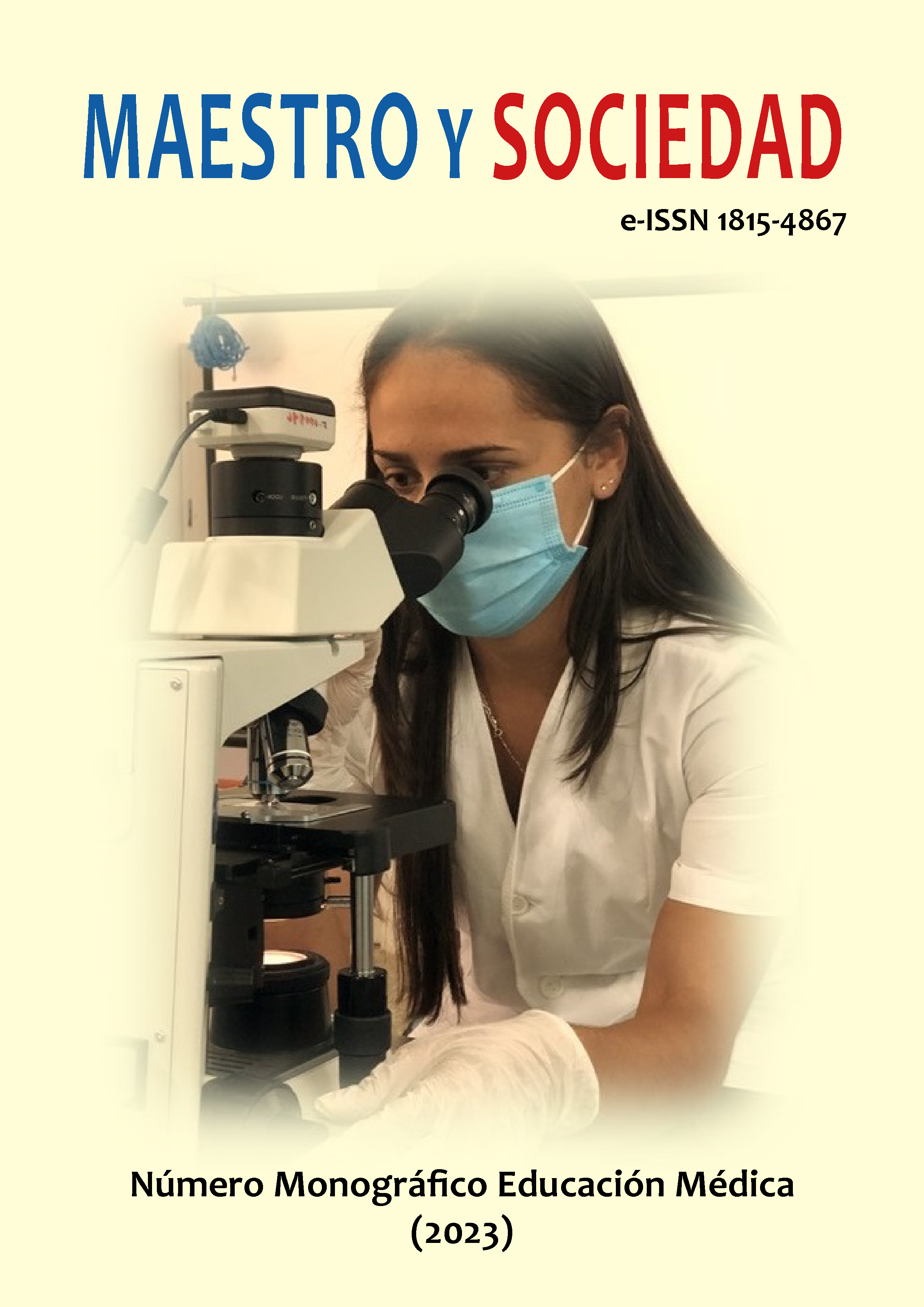Pedagogical alternative to education in values through the encounter class
Pedagogical alternative to education in values through the encounter class
Keywords:
pedagogical alternative, meeting class, formation of values, university studentAbstract
Introduction: The teaching-learning process of higher education demands new forms of teaching, therefore, it is necessary
to change the leading role of the teacher and the learner. In this sense, the meeting class becomes an organizational
form in contemporary pedagogy that serves as a tool to achieve greater effectiveness and efficiency in the learning of
students. Objective: Elaboration of a pedagogical alternative to promote the formation of values in the students of the
Marxism-Leninism and History specialty of the Palma Soriano Municipal University Center through the meeting class.
Materials and methods: Theoretical and empirical methods were used and data collection instruments were designed
that were applied to teachers and students. Results: They confirmed the need to guide students from the meeting class
to promote education in values based on the ideas, conceptions and guidelines of the 8th Party Congress. Discussion:
In the Central Report of the 8th congress of the Communist Party of Cuba, it states: "In ideological political work it is not enough to do more of the same, creativity is required, effectively adjusting to the scenario we live in, promoting
the study of the history of country, to convey to every Cuban the message of optimism and confidence that together
we will know how to face and overcome any obstacle. In summary, a profound transformation is required aimed at
promoting the essences and values that emanate from the work of the Revolution” (8th PCC Congress, Memoirs, p.37.
The proposed alternatives constitute an important tool for teachers to promote the formation of values. Conclusions:
Through the meeting class, the quality of the teaching-learning process is favored, not only so that the student can
acquire knowledge and skills, but also provide him with a system of values that regulate professional modes of action.
References
Bara, F. & Martínez, M. (2012). ¿Son universidades todas las universidades? La universidad como comunidad
ética. Bordón. Revista de pedagogía, 64(3), 77–92.
Benavides-León CA, López-Rodríguez NM. (2020). Retos contemporáneos para la formación permanente del
profesorado universitario. Educación y Educadores, 23(1):71-88. https://educacionyeducadores.unisabana.edu.co/
index.php/eye/article/view/12345.
Castro, R. (2021). Informe Central al 8vo. Congreso del Partido Comunista de Cuba. Presidencia de la República.
Colectivo de autores. (2018). Manual de normas y procedimientos de la Vicerrectoría Docente. Universidad de
Oriente. http://vrd.uniblog.uo.edu.cu/
Constitución de la República de Cuba. (2019). Ed. Política.
Fundación UNAM. (2013). El rol del maestro en el siglo XXI, un cambio radical de actitud. UNAM. http://www.
fundacionunam.org.mx/educacion/el-rol-del-maestro-en-el-s-xxi-un-cambio-radical-de-actitud/.
Heinze, A. y Chris, P. (2004). "Reflections on the Use of Blended Learning. Education in a Changing Environment
Conference Proceedings", University of Salford, Salford, Education Development Unit. http://www.ece.salford.ac.uk/
proceedings/papers/ah_04.rtf.
Hernández-Infante RC, Infante-Miranda ME. (2017). La clase en la educación superior, forma organizativa
esencial en el proceso de enseñanza-aprendizaje. Educación y Educadores, 20(1), 27-40.http://www.scielo.org.co/scielo.
php?pid=S0123-12942017000100027&script=sci_abstract&tlng=es
Horruitiner Silva P (2005). La nueva universidad cubana, Editorial Pueblo y Educación, La Habana.
Marín L, Suárez J, González Y y Pelegrín A. (2018). La clase encuentro en la educación superior: algunas
consideraciones teóricas-metodólogicas. Revista de Ciencias Humanísticas y Sociales (REHUSO), 3(3), 88-100. https://
doi.org/10.33936/rehuso.v3i3.1505.
Ministerio de Educación Superior, (2018). Reglamento Trabajo Docente y Metodológico. Resolución No. 2/2018.
Santiago, Rosana y Fonseca, César Darío (2016). “Ser buen profesor, una mirada desde dentro”, EDETANIA, 50,
-208. https://revistas.ucv.es/index.php/Edetania/article/view/27.
UNESCO (2019). https://es.unesco.org/themes/educacion-superior/ods.
Valle, A. D. (2012). La investigación pedagógica. Otra mirada. Pueblo y Educación.
Published
How to Cite
Issue
Section
License
Copyright (c) 2023 Yasmina Guilbeaux Milhet, Yunia Zamora Cuñat, Yelena Fernández Díaz, Maidilis Beltrán Moret

This work is licensed under a Creative Commons Attribution-NonCommercial-NoDerivatives 4.0 International License.
This journal provides immediate open access to its content, based on the principle that offering the public free access to research helps a greater global exchange of knowledge. Each author is responsible for the content of each of their articles.



























 Universidad de Oriente
Universidad de Oriente 